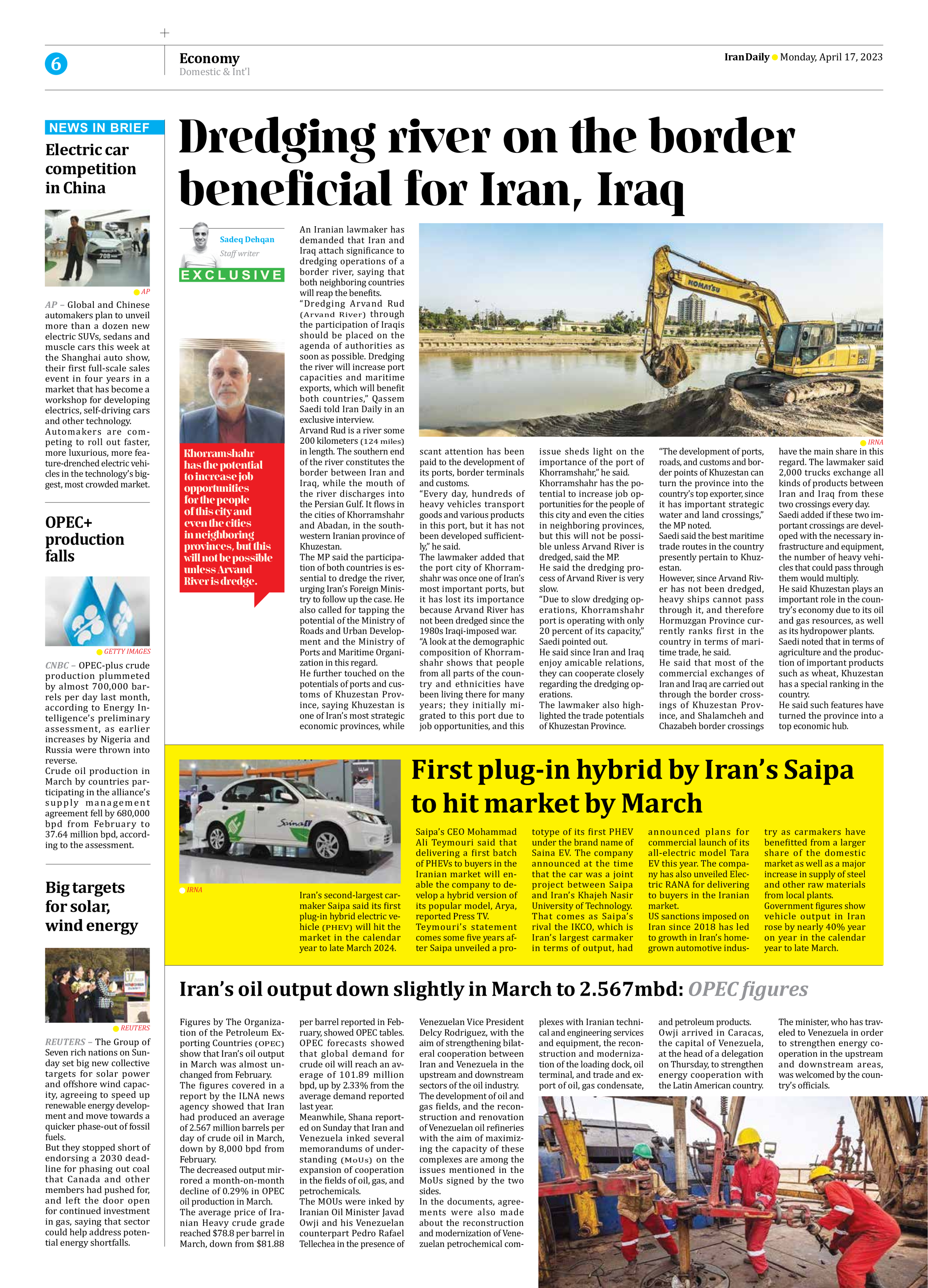
Dredging river on the border beneficial for Iran, Iraq
Sadeq Dehqan
Staff writer
An Iranian lawmaker has demanded that Iran and Iraq attach significance to dredging operations of a border river, saying that both neighboring countries will reap the benefits.
“Dredging Arvand Rud (Arvand River) through the participation of Iraqis should be placed on the agenda of authorities as soon as possible. Dredging the river will increase port capacities and maritime exports, which will benefit both countries,” Qassem Saedi told Iran Daily in an exclusive interview.
Arvand Rud is a river some 200 kilometers (124 miles) in length. The southern end of the river constitutes the border between Iran and Iraq, while the mouth of the river discharges into the Persian Gulf. It flows in the cities of Khorramshahr and Abadan, in the southwestern Iranian province of Khuzestan.
The MP said the participation of both countries is essential to dredge the river, urging Iran’s Foreign Ministry to follow up the case. He also called for tapping the potential of the Ministry of Roads and Urban Development and the Ministry of Ports and Maritime Organization in this regard.
He further touched on the potentials of ports and customs of Khuzestan Province, saying Khuzestan is one of Iran’s most strategic economic provinces, while scant attention has been paid to the development of its ports, border terminals and customs.
“Every day, hundreds of heavy vehicles transport goods and various products in this port, but it has not been developed sufficiently,” he said.
The lawmaker added that the port city of Khorramshahr was once one of Iran’s most important ports, but it has lost its importance because Arvand River has not been dredged since the 1980s Iraqi-imposed war.
“A look at the demographic composition of Khorramshahr shows that people from all parts of the country and ethnicities have been living there for many years; they initially migrated to this port due to job opportunities, and this issue sheds light on the importance of the port of Khorramshahr,” he said.
Khorramshahr has the potential to increase job opportunities for the people of this city and even the cities in neighboring provinces, but this will not be possible unless Arvand River is dredged, said the MP.
He said the dredging process of Arvand River is very slow.
“Due to slow dredging operations, Khorramshahr port is operating with only 20 percent of its capacity,” Saedi pointed out.
He said since Iran and Iraq enjoy amicable relations, they can cooperate closely regarding the dredging operations.
The lawmaker also highlighted the trade potentials of Khuzestan Province.
“The development of ports, roads, and customs and border points of Khuzestan can turn the province into the country’s top exporter, since it has important strategic water and land crossings,” the MP noted.
Saedi said the best maritime trade routes in the country presently pertain to Khuzestan.
However, since Arvand River has not been dredged, heavy ships cannot pass through it, and therefore Hormuzgan Province currently ranks first in the country in terms of maritime trade, he said.
He said that most of the commercial exchanges of Iran and Iraq are carried out through the border crossings of Khuzestan Province, and Shalamcheh and Chazabeh border crossings have the main share in this regard. The lawmaker said 2,000 trucks exchange all kinds of products between Iran and Iraq from these two crossings every day.
Saedi added if these two important crossings are developed with the necessary infrastructure and equipment, the number of heavy vehicles that could pass through them would multiply.
He said Khuzestan plays an important role in the country’s economy due to its oil and gas resources, as well as its hydropower plants.
Saedi noted that in terms of agriculture and the production of important products such as wheat, Khuzestan has a special ranking in the country.
He said such features have turned the province into a top economic hub.







